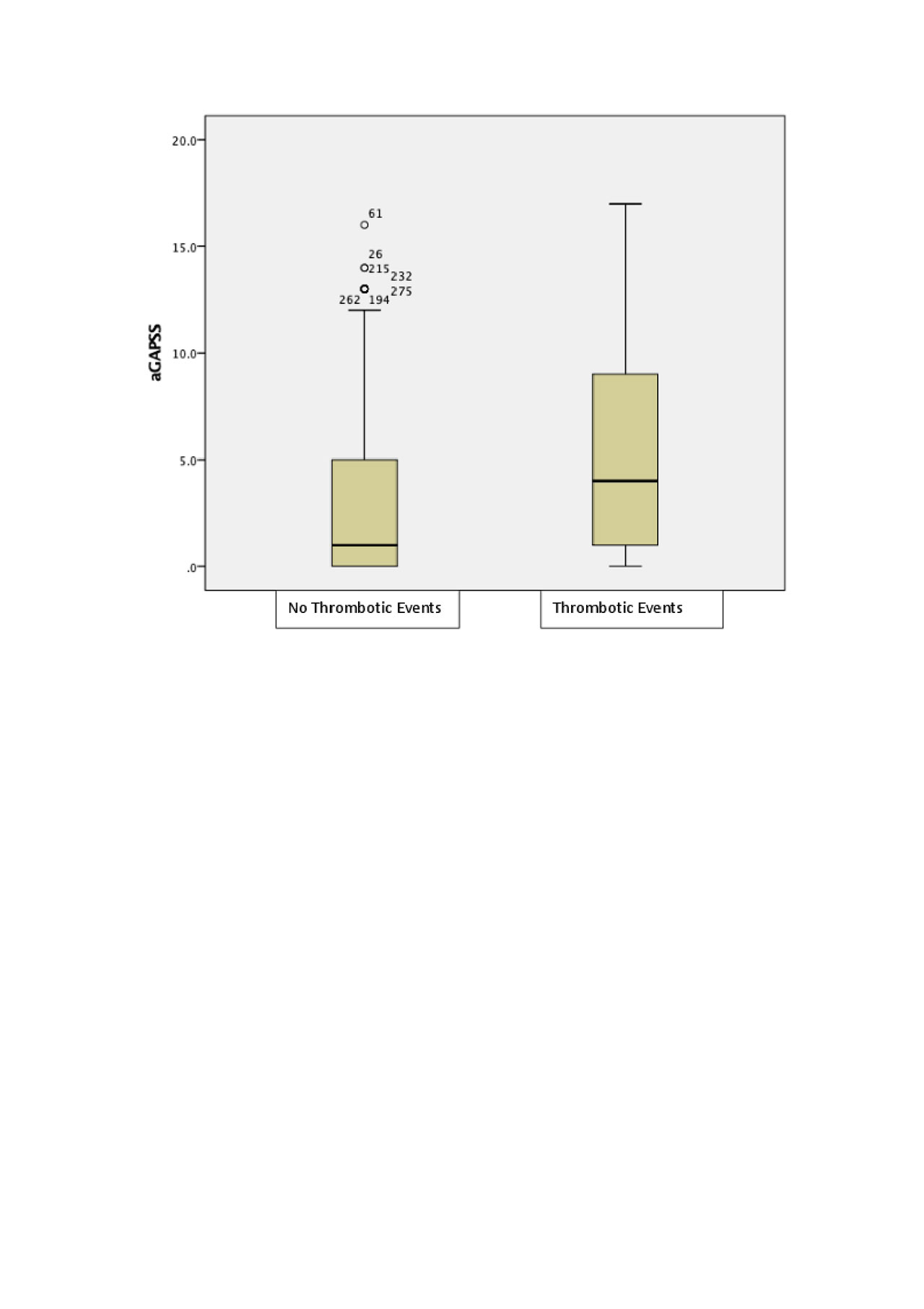Session Information
Session Type: Poster Session (Sunday)
Session Time: 9:00AM-11:00AM
Background/Purpose: Assessment of risk both for pregnancy morbidity and thrombosis in the presence of anti-phospholipid antibodies (aPL) is still a challenge. The Global Antiphospholipid Syndrome Score (GAPSS) takes into account the aPL profile (criteria and non-criteria), the conventional cardiovascular risk factors and the autoinmune antibody profile. An adjusted model of the score (aGAPSS) suggests that the score is able to stratify patients for their rate of events making it widely applicable in daily clinical practice. The aim was to evaluate the aGAPSS in an external multicentric cohort of Systemic Lupus Erythematous (SLE) patients in Argentina.
Methods: SLE patients from seven Rheumatologist centers were included. Traditional cardiovascular risk factors as Arterial Hypertension (AH), diabetes, smoking, obesity and hyperlipidemia were collected, as well as immobilization, surgery, pregnancy and contraceptive pills/ Hormonal Replacement Therapy (HRT). Immunological tests: antinuclear antibodies (ANA), anti-DNA, anti-Ro, anti-La, anti-RNP, anti-Sm and anti-phospholipid antibodies (Lupus Anticoagulant (LA), anti-cardiolipin (aCL) and β 2 Glycoprotein I (β2GPI) were evaluated. Received treatment: hydroxychloroquine, low doses of aspirin and oral anticoagulants. The score aGAPSS was calculated in each patient by adding together the points corresponding to the risk factors: 1 for AH, 3 for dyslipidemia, 4 for LA and B2GPI and 5 for aCL Score ranges from 0 to 17. Quantitative data were presented as a mean (SD) and were compared by using the t-test, analysis of variance (ANOVA) or the non-parametric Mann- Whitney test. A 95% confidence interval (CI) was selected and a p value< 0.05 was considered significant. The discriminative ability of the aGAPSS was calculated by measuring the area under the receiver operating characteristic curve (AUC). Multivariate logistic regression analysis was accomplished to examine the impact of multiple cardiovascular risk factors and laboratory parameters on the occurrence of thrombosis.
Results: Two-hundred eighty-six SLE patients were included (90.2% women, mean age at SLE diagnosis of 31.8 years (SD±12.3). One-hundred and sixteen patients (40.6%) presented thrombotic/ pregnancy complications. Fifty-four patients (18.9%) presented at least one thrombotic episode (64 events; 34 arterial and 30 venous thrombosis). Table 1 shows associated factors with thrombotic/ obstetrical events. Multivariate logistic regression analysis showed that aCL [OR 2.1 (CI 95% 1.15-3.9); p 0.016] and anti-Sm [OR 0.45 (CI95% 0.25-0.8); p 0.006] antibodies were independent risk factors for thrombotic events. Mean aGAPSS was significantly higher in patients who experienced a thrombotic event compared with those without [4.9 (SD±4.4) versus 3.1 (SD± 4.3); p 0.009]. The AUC showed that aGAPSS ≥4 presented the best diagnostic accuracy (0.63 p 0.03 IC95% 0.57- 0.70) with 61.2% sensibility and 62.9% specificity. The aGAPSS ≥4 was independently associated with thrombotic events OR 1.89 (CI 95% 1.89-3.85); p 0.013.
Conclusion: aGAPSS was significantly higher in patients who experienced a thrombotic event compared with those without. This score is a simple tool to use in SLE patients in daily practice.
To cite this abstract in AMA style:
Garcia L, Martire M, Velloso S, Savy F, Arizpe F, Garcia N, Testi A, Pena C, Capelusnik D, Isnardi C, Collado V, Rodriguez M, Pisoni C, Mazza S, Soria Curi Y, Seewald A, de la Torre M, Garcia M. Adjusted GAPSS in Systemic Lupus Erythematosus Patients in Argentina [abstract]. Arthritis Rheumatol. 2019; 71 (suppl 10). https://acrabstracts.org/abstract/adjusted-gapss-in-systemic-lupus-erythematosus-patients-in-argentina/. Accessed .« Back to 2019 ACR/ARP Annual Meeting
ACR Meeting Abstracts - https://acrabstracts.org/abstract/adjusted-gapss-in-systemic-lupus-erythematosus-patients-in-argentina/


